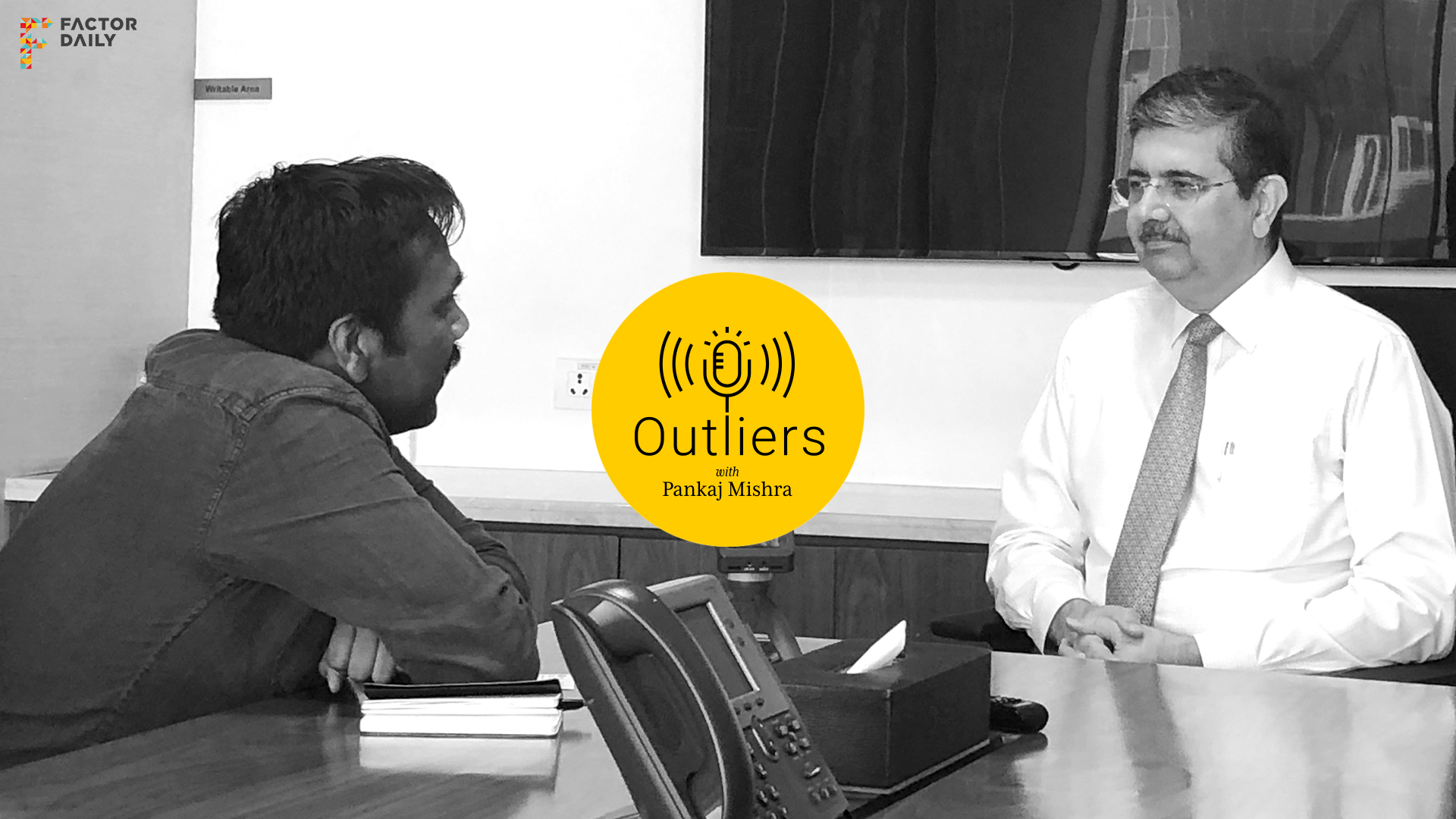At 59, Uday Kotak banks on over three-decades of business acumen in the financial services world to build the future, and keeps awake at night wondering if he will have his bank the next morning. For incumbent entrepreneurs such as Kotak, the forces of technology disruption are not science fiction anymore. In this episode of Outliers, I sit down with Kotak, who combines the old world business acumen with a sense of paranoia for the future in a way that very few leaders do. What makes him an Outlier is his hunger to learn the new, new thing and still keep the faith in the core principles of financial services based on trust and risk management. Here are edited (and abridged) excerpts from the conversation. Please do tune in and enjoy the full podcast.
Capitalism at work. Socialism within the family
Here was the family which was in agricultural commodities, so core business of the family was effectively capitalism at work, socialism within the family. It was a unique mix of concepts.
Then, as I completed my studies and went for my MBA in Mumbai, there came a time when I had to take a call what to do. I was a little concerned about joining the family business because I just felt that will I get my identity or not. And will I run the risk of losing identity. There was a job offer from Hindustan Lever immediately after my MBA and that’s when during a chat with my father, I came to the view that I want to start something entrepreneurial. And that’s when the journey on financial services started. These were very early days, well before technology had made any significant progress. This was 1983-84 actually. I decided to start a business which was essentially a business on bill discounting. Because in those days, banks used to lend money to customers at 17% and used to take deposits from customers at 6%. That was the model of Indian banking. And creditworthiness of a borrower didn’t matter. I stepped in and we started doing bill discounting, arbitraging between these two and effectively buying and selling bills of exchange, which was a perfectly legitimate activity allowed within the framework, and essentially lending at 16% and borrowing at 12%. And for the best quality companies such as Tatas, Mahindras and so on.
That’s how the business started. In the meantime, Anand Mahindra decided to take an equity stake in 1986, which is why we changed the name to Kotak Mahindra.
You will be surprised that till 1989 Indians could not get financing for a car, and there was a six months waiting period for a Maruti (car). We started booking Maruti cars and made it available for immediate delivery, provided the customers took financing from us.
In the nineties, I realised that India was little bit like a well, so went out and reached out to Goldman Sachs and did a joint venture for investment banking and securities. These joint ventures enabled us to learn a lot about how the financing business worked globally. We began to get a flavour of technology in our joint ventures because they were ahead in technology.
In 1998 we got into life insurance, and then we became a full fledged bank in 2003.
So the whole journey of building different pieces in a way reached its crucial point in 2003.
We were about three employees in 1986, we are more than 50,000 and we add about 6,000 in a year. That is important because even now we are creating net jobs in the economy when I am sure people will be wondering about the future of jobs.
Technology and the god
You know, on digital and technology I have a comparison. Think about god. If somebody asked me do you believe in god and I say yes. If there is a god, of course I am fine. And if I have said yes and there is no god, even then I am fine. But think for a moment, if I say no and there is a god, then I am in trouble. I think technology and digital are like that. Believe in it and while you don’t get carried away, there is no question in my mind that technology is changing lives. My childhood was without any television, I have seen how television has changed lives. In the nineties, we saw the change because of mobile. My kids can’t even believe in a life without mobiles. This is a change that has happened in our lives.

We have consistently seen the change, but what was the biggest tipping point for me was November 2016. The biggest tipping point for me in this whole journey. Thanks to demonetisation within a week an unknown brand became among the best known brands in India within one week. And here we were trying to build a brand for so many years. We were suddenly finding that we were not at the cutting edge.
Before that, we had seen the advent of Aadhaar, and we really grasped it post November 2016. By March 2017, we launched our unique digital account opening product based on Aadhaar. My real, full faith in technology as being the biggest changer of how financial services will be done in the future therefore, is a more recent phenomenon. And I am a believer that once you have conviction, you need to move fast. And I do have conviction that the future of financial services is going through a massive change, and this is not about getting carried away or anything like that. There will be a physical world, but there will be a much faster growing digital world. And our entire approach towards technology is what we call “phygital”, physical plus digital.
Building a bank for the future
First of all I have completely embraced the digital way of building a future for us. Having said that, there are two things to look at.
Number one is the core of banking and finance is also risk management and banks normally don’t fail on anything else but managing their risks. As you embrace technology, there are three key areas which we have to keep an eye on–number one is security.
I keep awake every night wondering whether I will have the bank next morning. Is it possible through technology somebody has taken all our customers’ money? And how are we protecting that future for our customers? Technology has a great plus, but comes with its challenges. Security is a big one.
Secondly, we have seen a big debate around security. It’s another big area, which we need to think about.
And lastly, thanks to technology we will now have a huge number of models, and even risk decisions could be based on those models.
What we have to be careful is not just technology, but the assumptions in the modeling. Because if your assumptions are wrong, we should not blame technology for what may be a huge issue on risk management.
I think the first job in finance is trust. Everything we do has to be tested in the context of customer’s trust. We have to keep fortifying the future of his and her money.

Incumbents vs disruptors
You know in the Indian financial services context, I look at how India is building its financial services different from a China or a U.S. China if you see, there is the development of an ecosystem, which includes finance. That is because Alibaba and Tencent have cornered the customer base. In the U.S., the customer base is owned significantly by Google and Facebook.
So one of the best things that has happened in India is that core customer base is on a public platform called Aadhaar, which is not owned by any private party. We as a bank are able to access customers, through the leads from Google and Facebook and others that we pay for, but we are able to access and own customers. The ownership of the customers is with us. And this is extremely important in the battle for the future.
My science fiction view of banking is that you will see a complete blurring of financial services and technology, and banks of the future will have to work at a quarter of their current cost models.
I don’t think about technology. I think about consumer and customer. What is increasing the convenience of a customer. That’s my driver for everything i do, not what technology can do for me, but what can i do for my consumers and how can technology enable that better. The driving point is end consumer rather than being obsessed with technology.
Crypto’s battle with the nations
My view on cryptocurrencies is that it has a huge battle with the nations. In fact, gold is an ideal crypto currency because it’s not owned by any nation or state and it’s the most trusted and established things. The problem with gold is that it’s in physical form. Crypto is not physical, but to build that kind of trust across nations is not easy, especially in a world paranoid with terror financing, slush money.


